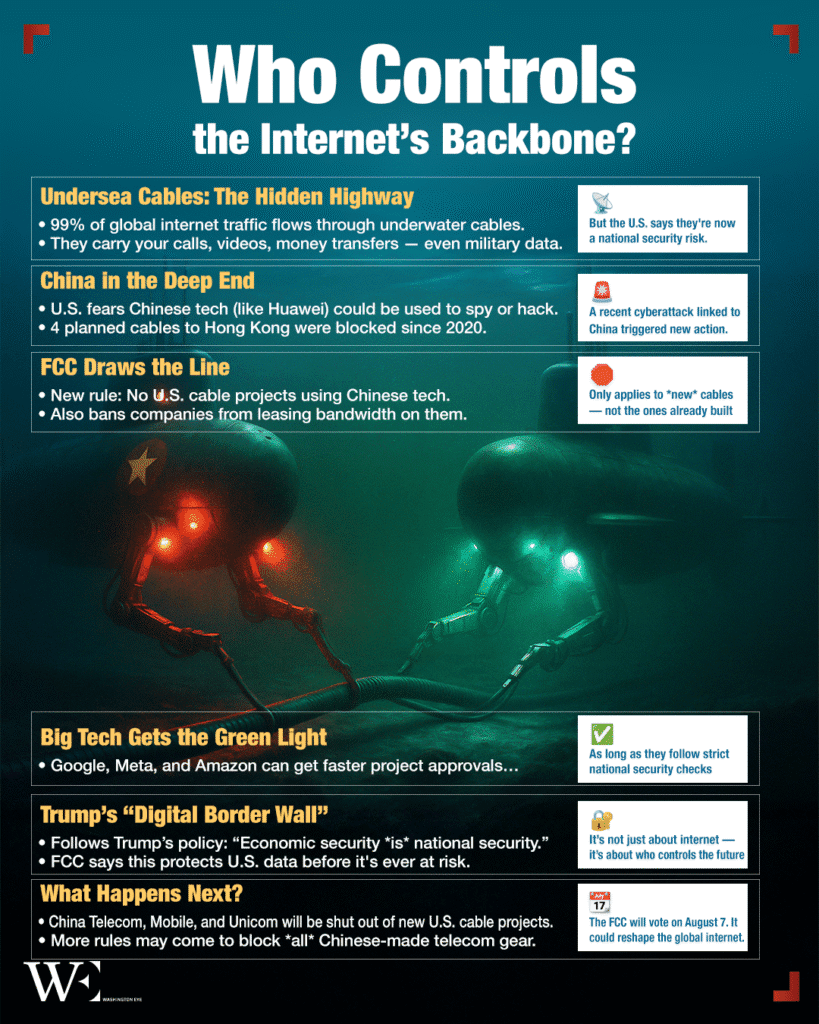The Washington Eye
The United States is taking dramatic steps to prevent Chinese technology from reaching the physical backbone of the global internet. On Wednesday, the Federal Communications Commission (FCC) announced plans to enact new rules prohibiting companies from connecting underwater communication cables to the United States if they rely on Chinese technology or equipment.
The decision comes amid mounting fears in Washington about the vulnerability of these underwater cables to cyber-espionage, physical tampering, and foreign influence especially from China. FCC Chairman Brendan Carr stated that the program was a direct response to “threats posed by foreign adversaries.”
“We have seen submarine cable infrastructure threatened in recent years by foreign adversaries, like China. We are therefore taking action here to guard our submarine cables against foreign adversary ownership and access as well as cyber and physical threats.” said the Chairman.
Why Submarine Cables Matter?
More than 99% of international internet traffic flows through a global network of submarine fiber-optic cables. Without them, global cloud computing, video calls, financial transactions, and even military communications would be put to a halt. As the U.S. is building more AI infrastructure and data centers, these digital arteries are becoming largely central to national security. Carr described them as the “Unsung heroes of global communications” and also pointed out to its weak points if the so-called adversaries gain access.
Why China Is the Target?
The U.S. government has long viewed Chinese telecom companies – such as Huawei Marine (now HMN Tech) and BOE, as potential national security threats. U.S. intelligence officials have warned that technology from these companies may be deployed to gather or reroute critical information. Since 2020, federal regulators have blocked or influenced the cancellation of at least four proposed subsea cable projects that would have connected the U.S. to Hong Kong.
Although Huawei has denied the allegations and China never acknowledged espionage claims, Washington is moving forward with a digital decoupling strategy especially after uncovering a large-scale cyberattack known as Salt Typhoon, which was carried out by Chinese operatives targeting US telecom systems.
What the FCC Rule Will Do?
- Ban new submarine cable licenses for projects involving flagged Chinese technologies.
- Bar companies from leasing bandwidth on cables built with restricted tech
- This applies only to new projects and not cables already in operation
- Fast-track license approvals for U.S. firms like Google, Meta, and Amazon if they meet national security guarantees
The rule is expected to be approved at the FCC’s next open meeting on August 7. There would also be a second proposal which is still in development and that would be to expand restrictions on all Chinese-origin telecom equipment, not just subsea projects.
Trump’s Doctrine of “Economic Security”
Indeed this move follows the “America First Investment Policy” memo issued by President Trump in January, which called for decoupling from adversary investments in critical U.S. infrastructure. Carr, who is a vocal advocate of Trump-era digital sovereignty policies, said the submarine rule is perfectly in line with this strategic vision. “President Trump has long recognized that economic security is national security,” he said
What This Means for the Future?
- China Telecom, China Mobile, and China Unicom, all which currently operate cables landing in the U.S. would be blocked from future projects.
- U.S. companies will face stricter compliance requirements, but also benefit from quicker licensing.
- Diplomatic backlash is expected from Beijing, which may view this new rule as an economic warfare.
This isn’t just about technology. It’s about keeping America’s data safe. By banning risky equipment in these cables, the government hopes to stop spying, hacking, and other threats before they even reach our shores. The FCC’s vote in August could mark a big turning point. As the world relies more on artificial intelligence and cloud services, owning the internet’s foundation is definitely becoming a matter of national security.














